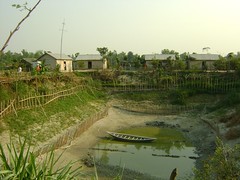Scaling up Community Based Adaptation: Coping or Adaptation strategies?

Nancy Omolo, University of KwaZulu Natal, South Africa, reports from the 5th Annual Community Based Adaptation to Climate Change Conference, in Dhaka, Bangladesh.
The conference, which is being held from 24-31 March, has attracted 350 international delegates from 60 different countries from all the continents of the world. The theme of CBA5 is “Scaling up Community Based Adaptation.” The term scaling up has two meanings. Firstly, it implies replication or multiplication from few hundreds (now) of adaptation initiatives to thousands and even hundred of thousands that will be needed in the future. Secondly, there is the notion of scaling up the policy chain from the very local or community level to higher levels of decision making within each country and as well as globally.
The delegates spent three days visiting eight sites in Bangladesh, each site demonstrating different climate changes impacts and communities adaptation responses and practices. Bangladesh is vulnerable to climate variability and change impacts in many ways, including sea level rise; increase in cyclones; enhanced intrusion of salt water; increased floods; drought; river bank erosion and erratic rainfall. The combination of all these generic impacts could create food insecurity, water scarcity, health impacts, displacements and migration.

One of the visits was to the Sirajganj District, an area affected by flood and river erosion, to see the community based adaptation projects firsthand. Action Aid is working in the area through an implementing partner Manab Mukti Shangstha (MMS), which is a local non-profit voluntary organisation. MMS is implementing various projects in Sirajgang such as buying land for the landless and settling them in raised communal flood proof homesteads, and buying cows/goats and hand loom machines for vulnerable women. Action Aid/MMS is also building toilets, water pumps and modern energy stoves for vulnerable families. An open floods centre is in place to be used as rescue centres during floods. Flood marking poles have been put up and there are trained volunteers to warn the community on upcoming floods. In terms of capacity building MMS has built various community resource centres and trained the local communities to do research (i.e. by developing resources maps and seasonal calenders).
Despite the work being done by Action Aid/MMS. There are many unanswered questions:
- Are these interventions coping or adaptation strategies to climate change?
- How are these interventions different from other poverty alleviation projects?
- Are the communities ready to deal with more intensified future climate risks?
- Are these projects sustainable when the funding stops?
- Can these projects move beyond pilot stage?
Sheikh Hasina, Honourable Prime Minister of Bangladesh had officially opened the meeting. The presence of the Prime Minister of Bangladesh at CBA5 demonstrates the government's commitment to tackling climate change issues.
The subsequent discussions were dominated by the definitions of coping and adaptation strategies. Coping was defined as short term and immediate, oriented towards survival and not continuous. While adaptation is oriented towards longer-term livelihood security, continuous process and results are oriented. At the same time it was agreed that it is more important to focus on building the capacities of communities than to worry about definitions.


